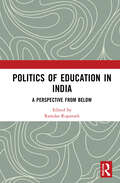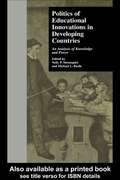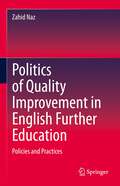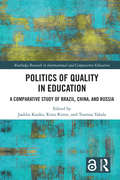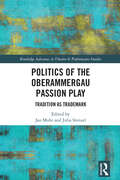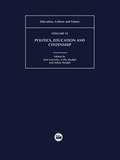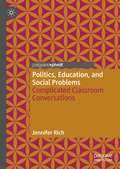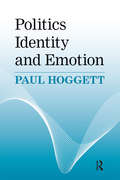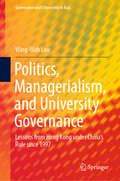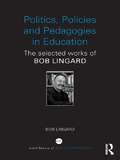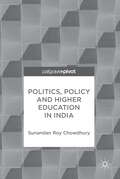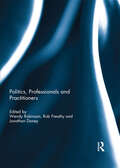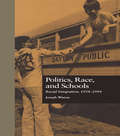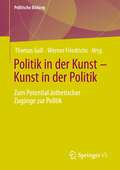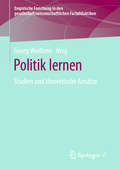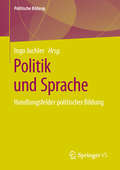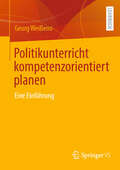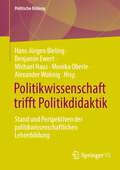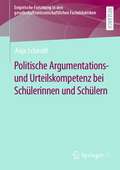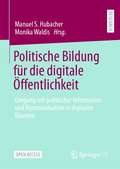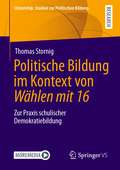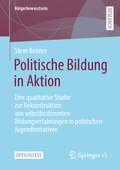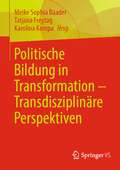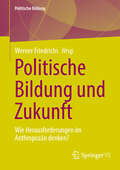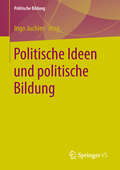- Table View
- List View
Politics of Education in India: A Perspective from Below
by Ramdas RupavathThis book studies the state of tribal education in India. India has the single largest tribal population in the world, yet the tribal community remains one of the most economically impoverished and marginalized groups in the country. The volume • Examines the educational status of the tribal population and studies developmental issues such as unemployment, illiteracy, caste discrimination, and inequality faced by the community. • Studies the implementation and execution of welfare schemes, initiatives, and reforms in place to tackle issues faced by tribal students and identifies loopholes in the various centrally sponsored schemes. • Emphasizes the importance of the Right to Education Act and presents policy implications for the educational uplift of India’s very many millions of tribal people. A critical study of the Indian education system, this book will be indispensable to students and researchers of education, education policy, minority studies, indigenous studies, sociology of education, and South Asian studies.
Politics of Educational Innovations in Developing Countries: An Analysis of Knowledge and Power (Reference Books in International Education #No. 46)
by Nelly P. Stromquist Michael L. BasileIn the educational arena, new ideas often compete as solutions to recurrent problems, making the concept of "innovations" a widespread discursive term. While expectations are substantial for each innovation, implementation of ideas has shown them to be more modest in practice. This book examines innovations in several developing countries, presenting case studies of technological, curricular, and organizational innovations selected for their magnitude in financial investment, scope, and duration. The case studies explore the social and political contexts that shaped the features of these innovations and what they accomplished over time in terms of teacher cost reduction, status mobility, access to education, and national unity. The experience of countries such as Brazil, Lesotho, the Philippines, and Namibia, and the influence of international agencies such as the World Bank are described and analyzed against theories of social and organizational change. The case studies themselves also serve as subjects for reflection on the prevailing positivist approaches to research and knowledge. The Politics of Educational Innovations should be of considerable interest to students of educational change, wither in the academic world or in the fields of government and international cooperation.
Politics of Quality Improvement in English Further Education: Policies and Practices
by Zahid NazThis book offers a rich account of how quality improvement agendas, informed by neoliberalism, create contradictory and complex contexts in which teachers produce different types of practices for specific purposes. Drawing on Michel Foucault’s analytical tools, archaeology and genealogy, this book weaves together findings from classroom observations, field notes and interviews to explore the dichotomies between practices focussing on day-to-day pedagogies and practices concerned with performance management and accountability initiatives. By attending to a Foucauldian conception of power and counter conduct, it explores new means of defining quality in teaching spaces. After considering existing quality assurance judgements, the book illuminates the significance of moving slightly away from an institutionalised enterprise culture and loosing relations with reductionist approaches as a starting point. While doing so, it reworks the idea of quality by presenting other ways of looking at the complex character of pedagogical real(s) with new insights into an emergentist and process-oriented conception of teaching practices. The book argues that we need to unlearn our existing knowledge of quality that overlooks contextual constraints and opportunities enmeshed in teaching practices. It questions the assumptions that the existing methods of observation are capable of quantifying the quality of education in a classroom or in a college in toto. By introducing the idea of documentisation, the book breaks new theoretical ground to show that this so-called system of robust accountabilities is not as self-evident as we believe and why we must rethink quality by unthinking our current common sense. Written for researchers in educational studies, practising teachers and policy makers, this book combines profound insights from theory and contemporary teaching practices with clear guidelines as to how educational policy making should be approached.
Politics of Quality in Education: A Comparative Study of Brazil, China, and Russia (Routledge Research in International and Comparative Education)
by Jaakko Kauko Risto Rinne Tuomas TakalaThe question of quality has become one of the most important framing factors in education and has been of growing interest to international organisations and national policymakers for decades. Politics of Quality in Education focuses on Brazil, China, and Russia, part of the so-called emerging nations’ BRICS block, and draws on a four-year project to develop a new theoretical and methodological approach. The book builds a comparative, sociohistorical, and transnational understanding of political relations in education, with a particular focus on the policies and practices of Quality Assurance and Evaluation (QAE). Tracking QAE processes from international organisations to individual schools, contributors analyse how QAE changes the dynamics in the roles of state, expertise, and governance. The book demonstrates how national and sub-national actors play a central role in the adaptation, modification or rejection of transnational policies. Politics of Quality in Education will be of great interest to academics, researchers and postgraduate students engaged in the study of comparative and international education, as well as educational policy and politics. It should also be essential reading for practitioners and policymakers. The Open Access version of this book, available at https://www.taylorfrancis.com/books/e/9781351362528, has been made available under a Creative Commons Attribution-Non Commercial-No Derivatives 4.0 license.
Politics of the Oberammergau Passion Play: Tradition as Trademark (Routledge Advances in Theatre & Performance Studies)
by Jan Mohr Julia StenzelThis collection provides a comprehensive overview of the Oberammergau Passion play and its history from the 19th century onwards. Specialists in theatre and performance studies, comparative literature, theology, political studies, history, and ethnology initiate an interdisciplinary discussion of how Oberammergau has built a trademark from tradition. A typological and historical outline of this development is followed by detailed analyses of the blending of spaces, temporalities, and cultures, through which Oberammergau as an institution is stabilized while at the same time remaining open to the dynamics of historical change. The authors comprise the formation of a theatrical public sphere, literary imaginations, and layers of authenticity in modern practices of distributed communication that culminate in the notion of tradition as trademark. This collection is analysed from a wide spectrum of cultural historical perspectives, ranging from literary studies, theatre and performance studies to theology, political studies, and ethnology.
Politics, Education and Citizenship
by Mal Leicester Sohan Modgil Celia ModgilVolume VI is concerned with political education and citizenship. Papers from several countries lend an international perspective to currently significant concerns and developments, including democracy, and democratic education, human rights, national identity and education for citizenship.
Politics, Education, and Social Problems: Complicated Classroom Conversations
by Jennifer RichThis book offers an innovative perspective on the intersection of politics, education, and social problems. It considers how we can create social change by talking about politics and social problems in more open, direct, and inclusive ways in educational spaces. Drawing on data from a range of settings, this book closely examines how and when complicated conversations take place in classrooms, schools, and communities. The book tackles a series of hot-button, timely issues, including race, religion, politics, and gender, and turns a critical eye to schools and the communities in which they are situated; the conversations adults have—and pointedly ignore—with one another; and, perhaps most critically, the politics that shape our society.
Politics, Identity and Emotion
by Paul HoggettIn this wide-ranging book, Paul Hoggett argues that human feelings and identities are constitutive of both personal and political life. Engaging with major debates in political theory, sociology, and psychoanalysis, he brings fresh insights to a range of issues: dynamics of political protest, intractable conflicts, fundamentalism and populism, the new political charismatics, the nature of forgiveness, and the relationship between anxiety and governance. The book is conceptually innovative and accessible, carefully introducing different theories of collective emotion and group identity and making extensive use of case studies from the U.S., England, and across the globe.
Politics, Managerialism, and University Governance: Lessons from Hong Kong under China’s Rule since 1997 (Governance and Citizenship in Asia)
by Wing-Wah LawThis book explores the interplay between politics, managerialism, and higher education, and the complex linkages between politics and public universities in Hong Kong. Since the mid-20th century, literature on the state, market, and higher education has focused on the state’s shifting role from the direct administration to the supervision of higher education, and its increased use of market and managerial principles and techniques to regulate public universities. However, very few studies have addressed the political influences on university governance produced by changing state-university-market relationships, the chancellorship of public universities, or students’ and academics’ civic engagement with regard to sensitive political issues. The book examines both the positive and problematic outcomes of using market principles and managerialism to reform public higher education; questions the longstanding tradition of university chancellorship; explores the issue of external members holding the majority on university governing boards; probes into the dilemma of either relying on the system or a good chancellor and external members to preserve universities’ autonomy and academic freedom; and assesses the cost of students’ and academics’ civic engagement with regard to politically sensitive issues.
Politics, Policies and Pedagogies in Education: The selected works of Bob Lingard
by Bob LingardIn the World Library of Educationalists, international experts compile career long collections of what they judge to be their finest pieces of work – extracts from books, key articles, salient research findings, major theoretical and practical contributions – so the world can read them in a single manageable volume. Readers will be able to follow the themes and strands and see how their work contributes to the development of the field. Bob Lingard has spent the last 30 years researching and writing in universities in Australia, England and Scotland about changing education policy issues. His work is written from a sociological perspective and with a commitment to social justice. He is the co-editor and co-author of 17 books and more than 100 journal articles and book chapters. In Politics, Policies and Pedagogies in Education, Bob Lingard provides critical sociological engagement with the politics of education. The focus is education policy and the impact of globalization, including epistemological and methodological issues necessary for researching education policy today. Topics analyzed include: educational restructuring new accountabilities and testing mediatization of education policy policy as numbers the global policy field and policy borrowing pedagogies. Lingard also considers the nature of educational research today. He has selected 12 of his key writings and in a critical introduction situates and contextualizes the work against key developments in the field and in the changing world.
Politics, Policy and Higher Education in India
by Sunandan Roy ChowdhuryConsidering the evolution of Indian higher education policy from British colonial rule to modern day India, this pivot examines key policy issues in fields as diverse as language, nationalism and economic development. Focusing on India's relationship with the world at large and the state of class conflict in India's universities, it assesses the country's politics as they have impacted education policy, as well as the state of higher education and of universities in India. The book contends that India's elite and power-stream have developed a higher education policy that has successfully catered to the creation and reproduction of a tiny economic elite which excludes the largest sections of higher education institutions and society. This skewed policy and its concomitant development has led to India remaining a pygmy nation when it comes to living standards or innovation in natural and social sciences. Through cutting edge interdisciplinary research, this pivot offers an insightful addition to the debate on higher education thinking, in India and further afield, across the realms of politics, policy and philosophy.
Politics, Professionals and Practitioners
by Wendy Robinson, Rob Freathy and Jonathan DoneyThis book presents eight distinctive historical chapters that explore the complex relationship between politics, professionals and practitioners in a range of different educational contexts. It offers a timely contribution to current debates about the contested place and status of educational professionalism in modern society. It is grounded in a firm commitment to the value that a historical perspective might bring to current and recurrent educational concerns, of which educational professionalism remains key.With fresh examples from nineteenth, twentieth and twenty-first century education, as well as a diversity of methodological approaches and sources, the book addresses a range of fundamental questions about educational professionalism. These include the wider politics of professionalism; issues of professional knowledge and expertise; what and who counts as professional within various power discourses; professional training, socialisation and accreditation; and professional identities, power, agency, autonomy regulation, accountability, and control. Overall, there is a sense from these chapters that there is something fractured and disconnected in current discourses around educational professionalism, but that there have been particular moments in the past when there was the promise of something different and possibly something more authentic. Moving beyond a narrow focus on schoolteachers as professional practitioners, to embrace a wider conceptualisation of educational professionalism within higher education, the churches, educational leadership, and quasi-professional and voluntary organisations, the book represents a rich and novel contribution to the field. The chapters in this book were originally published in various issues of History of Education and the British Journal of Religious Education.
Politics, Race, and Schools: Racial Integration, l954-l994 (Studies in Education/Politics #No. 2)
by Joseph WatrasFirst Published in 1997. Routledge is an imprint of Taylor & Francis, an informa company.
Politik in der Kunst – Kunst in der Politik: Zum Potential ästhetischer Zugänge zur Politik (Politische Bildung)
by Werner Friedrichs Thomas GollDer Band versammelt Beiträge der Arbeitsgruppe Hermeneutische Politikdidaktik zum Thema Politik und Kunst. Politik hat sich schon immer ästhetischer Mittel bedient, um sich zu inszenieren. Umgekehrt ist Kunst ein Reflex auf die politische Verfasstheit der Gesellschaft. Kunst eröffnet damit einen Zugang zur Politik mit hohem Potential für die politische Bildung.
Politik lernen: Studien und theoretische Ansätze (Empirische Forschung in den gesellschaftswissenschaftlichen Fachdidaktiken)
by Georg WeißenoIm wissenschaftlichen Diskurs über politische Bildung lässt sich seit etwa dreißig Jahren eine starke Betonung empirischer Forschung feststellen. Durch die Entwicklung systematischer empirische Forschung hat sich zugleich die Frage nach der theoretischen Begründung der Politikdidaktik neu gestellt. Die Autorinnen und Autoren des vorliegenden Bandes untersuchen die Wissensvermittlung als eine Hauptaufgabe des Politikunterrichts. Sie verbinden sie mit individuellen Merkmalen wie der Motivation, unterrichtlichen Determinanten wie der Unterrichtsqualität und Kontextfaktoren wie dem Migrationshintergrund. Die theoretischen und empirischen Entwicklungen haben zu einer Ausdifferenzierung der Politikdidaktik und zu einem neuen Blick auf die Praxis des Politikunterrichts geführt.
Politik und Sprache: Handlungsfelder politischer Bildung (Politische Bildung)
by Ingo JuchlerSprache spielt im Hinblick auf politisches Handeln eine sehr bedeutsame Rolle. Die Auseinandersetzung mit dem Verhältnis von Politik und Sprache erscheint umso notwendiger, als dieses Verhältnis in der gegenwärtigen politischen Bildung ein Schattendasein fristet. Der schulischen politischen Bildung kommt die Aufgabe zu, Schülerinnen und Schüler zu einem Umgang mit der politischen Sprache zu befähigen, der ihnen eine reflektierte Auseinandersetzung mit den in der Debatte stehenden politischen Gegenständen ermöglicht – auch und gerade vor dem Hintergrund der Zunahme populistischer Darstellungen, „alternativer Fakten“ und Lügen in der Politik. Mit der vorliegenden Publikation liegt ein erster Aufschlag vor, der das Spektrum des Verhältnisses von Politik und Sprache im Kontext der Handlungsfelder politischer Bildung umreißt.
Politikunterricht kompetenzorientiert planen: Eine Einführung
by Georg WeißenoDieses Lehrbuch erläutert die Zusammenhänge, Entwicklung und Anwendung einer kompetenzorientierten Planung von Politikunterricht. Gezeigt wird, welche Faktoren es für den Aufbau einer Politikkompetenz bei den Schüler*innen zu beachten gilt und wie die Planungskompetenz zu erwerben ist. Für das Verstehen dieser Bedingungen und Lernprozesse hilfreich ist die Kenntnis theoretischer politikdidaktischer Hintergründe und der Verfahren der Kompetenzmessung. Die Ergebnisse evidenzbasierter politikdidaktischer Forschung werden berichtet und dienen als Hintergrund für die Planungsschritte in der Unterrichtsvorbereitung. Das Verständnis der Kompetenzorientierung und die Planung effektiver Unterrichtsstunden wird in dem Buch vertiefend erläutert. Kompetenzorientierter Unterricht führt nachweislich zu besseren Lernergebnissen. Er vermag den Bedürfnissen der Schüler*innen und den Zielen des Politikunterrichts besser gerecht zu werden.
Politikwissenschaft trifft Politikdidaktik: Stand und Perspektiven der politikwissenschaftlichen Lehrerbildung (Politische Bildung)
by Michael Haus Monika Oberle Alexander Wohnig Benjamin Ewert Hans-Jürgen BielingVor dem Hintergrund bildungspolitischer und gesellschaftlicher Veränderungen untersucht der Sammelband Stand und Perspektiven der politikwissenschaftlichen Lehrerbildung in zentralen Themenfeldern in Deutschland. Ziel ist es, die Relevanz der Lehrerbildung in der Politikwissenschaft in die gesamte Disziplin hinein zu verdeutlichen, einen vertieften Austausch zwischen Fachwissenschaft und Fachdidaktik zu befördern und Wege zur zukünftigen Aufstellung des Faches im Bereich der Lehrerbildung aufzuzeigen.
Politische Argumentations- und Urteilskompetenz bei Schülerinnen und Schülern (Empirische Forschung in den gesellschaftswissenschaftlichen Fachdidaktiken)
by Anja SchmidtAnja Schmidt thematisiert in diesem Buch politikdidaktische Setzungen und Modelle der politischen Argumentations- und Urteilskompetenz unter Bezug auf den theoretischen und empirischen Stand der Fachdidaktik. Die Autorin geht der Frage nach, ob sich theoretische und empirische Lücken ("gap of judgement") in der politischen Argumentations- und Urteilsfähigkeit finden und untersucht die belastbare empirische Bewährung eines aktuellen Theoriemodells der politischen Urteilskompetenz.
Politische Bildung für die digitale Öffentlichkeit: Umgang mit politischer Information und Kommunikation in digitalen Räumen
by Monika Waldis Manuel S. HubacherIn diesem Open-Access-Sammelband setzen sich Autor*innen aus unterschiedlichsten Disziplinen mit der Auswirkung einer digitalisierten Öffentlichkeit für die Politische Bildung auseinander. Sie erörtern, wie sich die Formen digitaler politischer Kommunikation auswirken, wie der Politikunterricht mit der veränderten Ausgangslage umgehen könnte und welche Kompetenzen Schüler*innen benötigen, um in der digitalen Öffentlichkeit selbstbestimmt und -ermächtigt politisch teilzuhaben. Die Komplexität und die Interdependenzen digitaler Kommunikation verlangen nach einer multiperspektivischen und transdisziplinären Perspektive, der dieser Band verpflichtet ist.
Politische Bildung im Kontext von Wählen mit 16: Zur Praxis schulischer Demokratiebildung (Citizenship. Studien zur Politischen Bildung)
by Thomas StornigDie qualitative Studie untersucht die Vorstellungen von Lehrpersonen und Schüler*innen an zwei verschiedenen Schultypen und bietet damit einen bisweilen raren empirischen Einblick in den Status quo des Politikunterrichts in Österreich. Vor dem Hintergrund der Herausforderung Wählen mit 16 eröffnen abweichende schulische Strukturen der Politischen Bildung unterschiedliche Handlungsräume, die Lehrpersonen mit unterschiedlicher Professionalität und Passion zu nutzen wissen. Aus der Perspektive der Lernenden erscheint indessen eine schüler*innenorientierte Didaktik als Grundvoraussetzung, damit die schulischen Angebote zur Auseinandersetzung mit Fragen des Politischen auch angenommen werden. Die Studie stellt einen Beitrag zur domänenbezogenen Erforschung von Lehrer*innenprofessionalität dar und formuliert zudem Vorschläge für eine wirkungsvollere Verankerung und Umsetzung Politischer Bildung.
Politische Bildung in Aktion: Eine qualitative Studie zur Rekonstruktion von selbstbestimmten Bildungserfahrungen in politischen Jugendinitiativen (Bürgerbewusstsein)
by Steve KennerIn diesem Open-Access-Buch geht Steve Kenner der Frage nach, inwiefern sich politische Bildungsprozesse aus den Partizipationserfahrungen junger Menschen rekonstruieren lassen. Er begleitete politische Jugendinitiativen und führte Interviews mit politisch aktiven Jugendlichen (u.a. Fridays for Future und Antirassismus-Arbeitsgemeinschaften). Die Ergebnisse der Untersuchung offenbaren, dass die selbstbestimmte politische Aktion zu vielfältigen Bildungsgelegenheiten führt. Quellenkritik, Recherche, Auseinandersetzung mit vielfältigen Perspektiven sowie das sachliche und wertgebundene Beurteilen zeichnen die Erfahrungen der Jugendlichen aus. Sie erleben Selbstwirksamkeit, lernen mit Misserfolgen umzugehen, Konflikte zivil zu lösen, sich im Kollektiv politisch zu organisieren und damit verbundene Herausforderungen zu bewältigen. Die begleiteten Gruppen erweisen sich nicht als homogene politische Gemeinschaft. Und dennoch besteht die Gefahr der Verinselung in ihrem Protest. Hier kann und sollte die formale politische Bildung und die demokratische Schulentwicklung ansetzen und die Partizipationserfahrungen in der politischen Aktion als Bildungsgelegenheit verstehen.
Politische Bildung in Transformation – Transdisziplinäre Perspektiven
by Meike Sophia Baader Tatjana Freytag Karolina KempaDer Band geht aus interdisziplinären Perspektiven sich aktuell neu stellenden Fragen der Politischen Bildung nach. Herausforderungen wie Populismus, Prozesse der Re-Nationalisierung und Destabilisierung der EU fordern Akteure politischer Bildung auf, sich grundsätzlich zu öffnen, neu zu orientieren und wirklich neu zu vermessen.
Politische Bildung und Zukunft: Wie Herausforderungen im Anthropozän denken? (Politische Bildung)
by Werner FriedrichsPolitische Bildung bezieht ihren Sinngehalt u. a. aus der Idee einer gelingenden Begegnung mit dem Zukünftigen. Im 3. Jahrtausend muss sie sich allerdings – jenseits der Alternative zwischen einer unausweichlichen, düsteren Katastrophe und einem naiven Machbarkeitsoptimismus – der Frage nach der (un)möglichen Gestaltbarkeit der Zukunft stellen. Denn im Anthropozän wird die Zukunft zunehmend brüchig. Das wirft Fragen von zentraler Bedeutung auf. Wie kann sich die politische Bildung zukünftig auf das Zukünftige beziehen? Welche Themen und Fragen werden zukünftig wichtig sein? Welche didaktischen Methoden und Prinzipien sind zukünftig noch tragfähig? In den Beiträgen wird mit unterschiedlichen Schwerpunkten nach Antworten gesucht.
Politische Ideen und politische Bildung (Politische Bildung)
by Ingo JuchlerDieses Buch hat die Beobachtung zum Ausgangspunkt, dass politische Ideen seit jeher das politische Denken und die politische Praxis bestimmen. Sie sind mit dem Politischen verwoben, sei es offensichtlich, implizit oder kaschiert. Doch wie steht es um das Verhältnis politischer Ideen und politischer Bildung? Als Unterrichtsgegenstände stehen sie in den schulischen Curricula. In den einschlägigen Nachschlagewerken der politischen Bildung finden politische Ideen allenfalls indirekt Beachtung. In den Beiträgen des Sammelbandes wird das Verhältnis politischer Ideen und politischer Bildung in seinen unterschiedlichen Dimensionen reflektiert.
